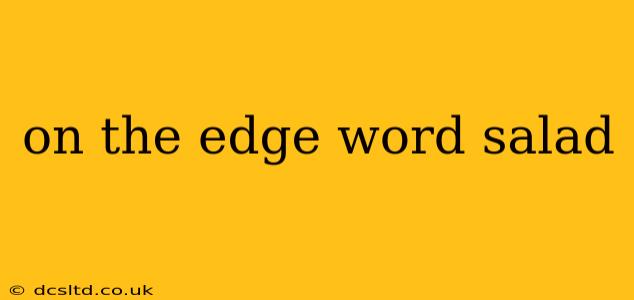On the Edge: Deconstructing the Phenomenon of "Word Salad"
The term "word salad" evokes a sense of linguistic chaos, a jumble of seemingly unrelated words tossed together with little grammatical structure or logical coherence. While it might sound like a whimsical culinary creation, in reality, "word salad" carries significant implications, particularly in the fields of psychology and linguistics. Understanding its nuances requires a careful examination of its various contexts and interpretations.
What exactly is "word salad" and where does the term originate?
The term "word salad," or its German equivalent "Wortsalat," describes speech characterized by incoherent and illogical connections between words and phrases. It's not simply a matter of poor grammar or mispronunciations; it represents a deeper breakdown in the cognitive processes responsible for constructing meaningful sentences. The origin of the term is rooted in the observation of disordered speech patterns in individuals experiencing certain mental health conditions, primarily schizophrenia. It's a descriptive term, used to illustrate the fragmented and disorganized nature of their communication.
Is "word salad" always a sign of a serious mental health condition?
While "word salad" is strongly associated with serious mental illnesses like schizophrenia, it's crucial to understand that it's not a definitive diagnostic indicator. Other conditions, such as aphasia (a language disorder resulting from brain damage), severe dementia, or even temporary states of cognitive impairment due to intoxication or injury, can also manifest in speech resembling "word salad." Therefore, observing "word salad" in someone's speech warrants careful consideration of their overall health and cognitive state, but should not be used to make a diagnosis without professional assessment.
How does "word salad" differ from other forms of disordered speech?
Distinguishing "word salad" from other forms of disordered speech, like pressured speech (rapid, continuous talking) or circumstantial speech (tangential and rambling), is important for accurate diagnosis and treatment. While all these can indicate underlying cognitive issues, "word salad" is uniquely characterized by the seemingly random juxtaposition of words, lacking even the loose connections found in circumstantial speech. The absence of a discernible meaning or coherent message is the key differentiating factor.
Can you give examples of "word salad"?
Examples of "word salad" can vary greatly, depending on the individual and their specific condition. However, they generally share a lack of grammatical structure and logical flow. Consider phrases like: "The purple elephant jumped over the lazy moon, singing songs of green cheese." or "The clock is running, the sky is crying, and my shoes are singing blues." These sentences utilize seemingly unrelated words and images, creating an illogical and incomprehensible message. The core issue is not just incorrect grammar, but a disjointed thought process that prevents the formation of coherent communication.
What causes "word salad" and how is it treated?
The causes of "word salad" are multifaceted and directly tied to the underlying condition causing it. In the case of schizophrenia, it's believed to be related to disruptions in brain circuitry that affects language processing and cognitive organization. Treatment typically focuses on addressing the root cause. This might involve medication to manage symptoms, therapy to improve cognitive functioning and communication skills, and supportive interventions to improve overall well-being. For other conditions leading to similar speech patterns, treatments will vary depending on the specific diagnosis.
Can “word salad” be used creatively or artistically?
While the clinical use of “word salad” highlights a cognitive deficit, some might argue that its inherent disjointedness can be harnessed creatively. In experimental literature or avant-garde poetry, intentionally using fragmented language could convey feelings of disorientation, alienation, or the fragmented nature of reality. However, it's crucial to distinguish between intentional artistic use and the unintended manifestation of a cognitive impairment. The context, intent, and overall message are paramount in this differentiation.
In conclusion, understanding "word salad" requires moving beyond its initial whimsical connotation. It represents a complex linguistic phenomenon with profound implications for understanding cognitive function and mental health. While it’s often associated with serious conditions, careful observation and professional assessment are crucial for accurate diagnosis and appropriate intervention.
